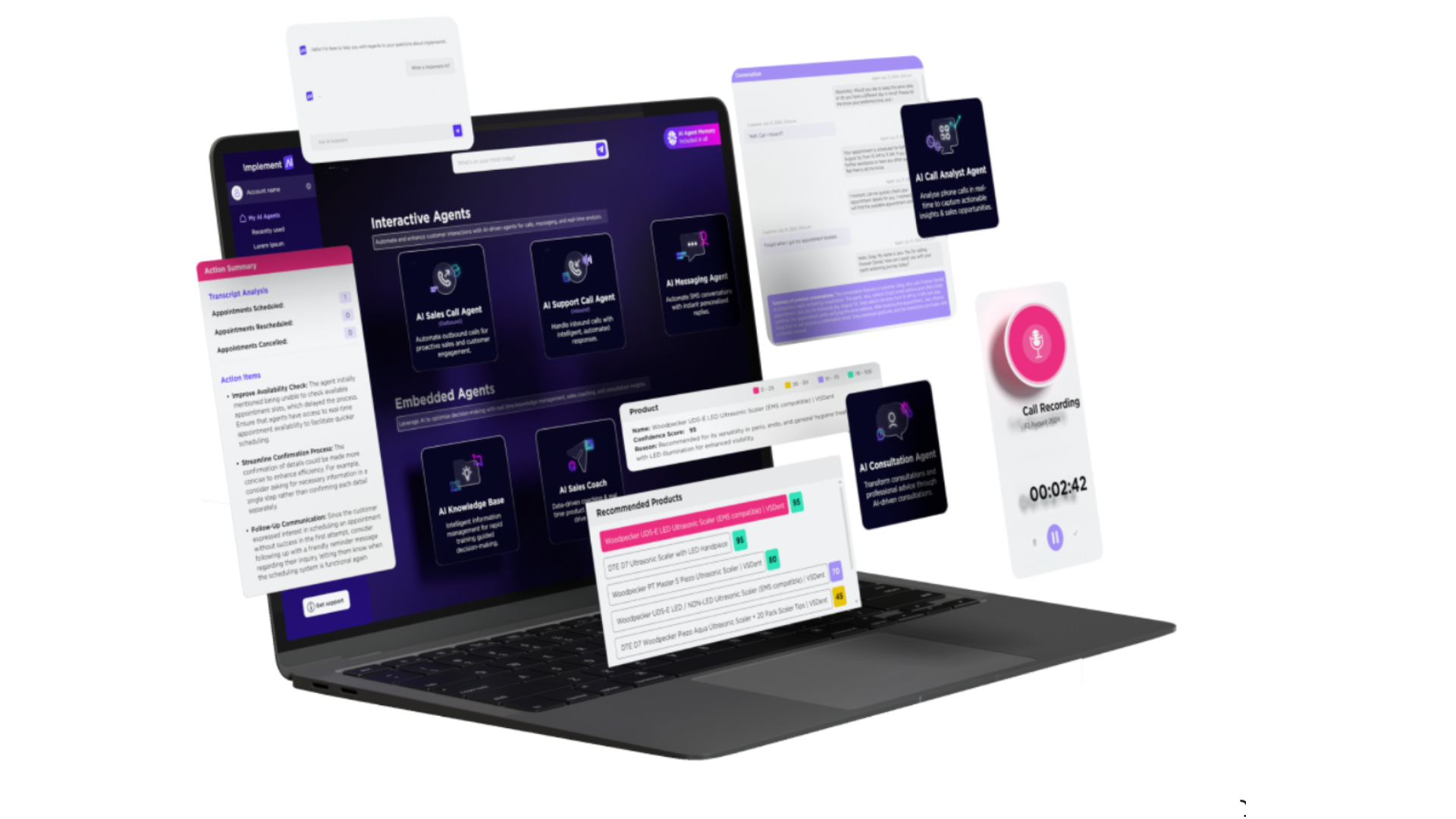Integrating AI Agents: The Complete Blueprint for Your Digital Workforce
March 6, 2025
Integrating AI agents is the fastest route to a scalable digital workforce.
The 6-Stage Framework for Integrating AI Agents
Operating costs are rising while customers expect 24/7 service. Integrating AI agents adds:
-
Capacity – handle 10× more tasks without headcount
-
Capability – real-time guidance, sentiment and insights
-
Continuity – always-on support across phone, email, WhatsApp
What Can AI Agents Do? (Capacity + Capability)
| Category | AI Agent Example | Business Impact |
|---|---|---|
| Sales | AI Sales Coach | +35 % close rate |
| Support | AI Knowledge Base | –40 % AHT |
| Ops | Inventory Agent | –25 % stock-outs |
| Compliance | Call Analyst | 100 % script adherence |
The 6-Stage AI Agent Integration Framework (HowTo rich-result bait)
-
Identify Impact Areas – rank sales, support, ops by ROI.
-
Map Business Processes – document tasks ripe for automation.
-
Design Agent Configurations – set guardrails, hand-off logic.
-
Integrate With Systems – CRM, ERP, vector knowledge base.
-
Train Your Team – embed AI agents into daily workflows.
-
Monitor & Optimise – iterate scripts, prompts and KPIs weekly.
(Add HowTo schema—see code block below.)
Real-World Use Cases
-
Customer Reactivation – AI Sales Agents increased win-back by 28 %.
-
Compliance Monitoring – Call Analyst flagged 97 % of risk calls.
-
AI-Powered Research – Research Agent cuts market-intel time 3×.
Read how Klarna replaced legacy apps with in-house AI agents (Investor Update, 2024).
Why “Integrating AI Agents” Beats Simple Automation
Traditional RPA and chatbots handle narrow, rules-based tasks. In contrast, integrating AI agents embeds reasoning, learning and multi-channel execution directly inside your workflows. A 2024 Gartner report predicts companies that fully integrate AI agents will cut operational costs by 31 % and grow revenue twice as fast as peers. [ [Gartner]
Key Differentiators
-
Context awareness – agents tap CRM, ERP and vector knowledge bases in real time.
-
Cross-channel orchestration – one agent drives phone, email and WhatsApp simultaneously.
-
Self-optimising – prompt tuning and retraining happen continuously, not quarterly.
Mini-Case: Retail Flash-Sale Support
Fashion retailer StitchTrend integrated AI agents before Black Friday. The support agent deflected 82 % of inquiries, updated Shopify inventory in real time and delivered a 4-point CSAT boost—all within three weeks of deployment.
Mini-Case: B2B Pipeline Acceleration
SaaS vendor CloudSync used an outbound AI Sales Agent to revive dormant leads. Pipeline velocity increased 47 %, and human reps closed 19 % more deals, proving that AI agent integration scales revenue without additional headcount.
FAQs
What’s the first step in integrating AI agents?
Identify the workflow with the highest cost or slowest cycle time—usually customer support or outbound sales.
How long does AI agent integration take?
Most SMEs launch their first production agent in 4–6 weeks.
Do AI agents replace staff?
They offload repetitive work so humans focus on relationship-building and complex problem-solving.
How much does it cost?
Entry projects start around £2-3 K/month for model hosting, orchestration and support.
Common Pitfalls When Integrating AI Agents – and How to Avoid Them
-
Pilot Paralysis – Some teams run endless proofs-of-concept that never hit production.
Fix: Tie every pilot to a revenue or cost KPI and set a 6-week go-live deadline. -
Data Blind Spots – Agents trained only on public data miss the nuance of your proprietary context.
Fix: Start vectorising CRM notes, support transcripts and knowledge-base articles early in the process. -
Isolated Deployments – Dropping a lone chatbot into customer service delivers limited ROI.
Fix: Orchestrate multiple agents—sales, support and ops—so insights loop across departments. -
Shadow IT Risks – Teams sometimes connect SaaS agents without governance.
Fix: Route every integration through a central AI Working Group; enforce zero-trust security and audit logging. -
Change-Management Gap – Humans fear replacement, slowing adoption.
Fix: Present AI agents as force-multipliers, offer “prompt-engineering” training and share quick-win success stories company-wide.
By anticipating these hurdles, companies integrating AI agents can accelerate time-to-value instead of learning painful lessons on the fly.
Next Steps
Ready to deploy your digital workforce? Book your discovery call or explore our AI Operating System guide for deeper architecture insights.





